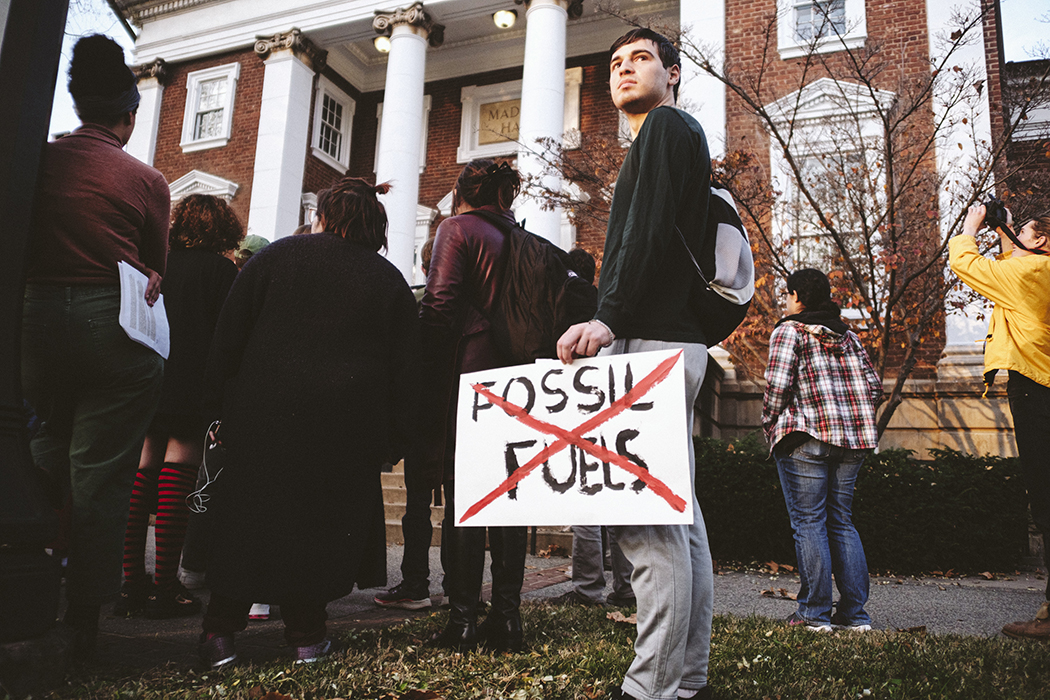A student-led campaign to pressure the University of Virginia to fully withdraw its investments in the fossil fuel industry has gained momentum in recent years with petitions and public protests. Last month, the University of Virginia Investment Management Company finally addressed some of these concerns by publishing a framework that lays out principles the school will follow for investing in fossil fuel companies.
Students and sustainability advocates, however, say that this isn’t enough.
The move “feels like it’s divestment,” but will not constitute full divestment in practice, says UVA Student Council Sustainability Co-director Aayusha Khanal.
“I would like to see full, complete divestment from the fossil fuel industry because I just don’t understand how it is an ethical, or moral, or political, or social, or economically viable thing to do,” she says.
UVIMCO’s framework creates criteria that fossil fuel producers receiving UVA funds are expected to follow. But DivestUVA, a student organization that has advocated for fossil fuel divestment since it was founded in 2015, sees responsible fossil fuel divestment as an oxymoron.
“I think that responsible investment in fossil fuels is an antithetical statement,” says Khanal, who is also a member of DivestUVA. “Fossil fuel industries, especially the big ones, have these climate change goals where they’re trying to be more sustainable, but if you just look at the fine print for just a second longer, you’ll realize that they’re still operating under the same dirty tactics they did a decade ago.”
In the coalition’s first public statement this semester, DivestUVA acknowledged that these new changes are an improvement but questioned the details of the framework and whether responsible fossil fuel investment is even possible. The group last hosted a rally in December during which they pinned their demands on UVA President Jim Ryan’s door.
The statement examined each of four proposed principles UVIMCO laid out for fossil fuel companies: to be transparent, adopt best practices, safeguard the environment, and act with integrity. Each was challenged for being vague and or not plausible.
“Fossil fuel companies, by virtue of their existence, are harmful to the environment,” reads DivestUVA’s statement. “There is no amount of responsible operation that can reverse this fact.”
Maille Bowerman, Student Council sustainability co-director and member of DivestUVA, condemned the ongoing lack of transparency in UVIMCO’s policies, which fail to address important questions such as who stakeholders are and the metrics used to distinguish a good fossil fuel company from a bad one.
“There’s only so much activism that can happen when you don’t even know what’s going on behind closed doors,” she says.
According to UVIMCO’s statement, the company has no direct investments in thermal coal or tar/oil sands and only .05 percent in fossil fuels. Less than 6 percent of indirect investments, funds that hold shares in fossil fuels companies, go toward natural resources.
At UVA, fossil fuels are primarily for heating, with the vast majority of UVA’s fossil fuels used to heat buildings. The rest goes toward smaller things like cooking, dryers, and Bunsen burners in laboratories.
Paul Zmick, director of energy and utilities at UVA, says that in order for the university to get off fossil fuels, it has to change the infrastructure of its buildings and rely on new technologies for heating.
Options currently in the works include increasing building efficiency through installing low-temperature hot water systems, using heat recovery chillers, eliminating coal, and using geoexchange, which involves storing excess heat during the summer underground for use in the winter. Whereas the heat production efficiency of natural gas, a primary fossil fuel, ranges from 80 to 85 percent, these new technologies are far more efficient.
The first step will be getting off coal, and then it will be continuing to expand heat recovery chillers and geoexchange before ultimately connecting these heating and cooling loops together to reduce fossil fuel use, a process that Zmick says can mostly be accomplished in 10 years.
The biggest obstacle, however, is the UVA Medical Center—it relies on steam, which is largely made through the combustion of fossil fuels.
“If we were able to get the Medical Center off steam in the next decade, certainly, within 15 to 20 years, we could be fossil fuel free…I think in that 2040 timeframe is realistic,” Zmick says.
UVA has publicly announced a commitment to becoming fossil fuel free by 2050. UVIMCO, however, has not made a similar statement and did not respond by press time to C-VILLE’s request for information on a divestment goal.
“UVIMCO should be aligning itself more with UVA’s commitment to be fossil fuel free by 2050 to keep the consistency in messaging,” says Bowerman.
UVA’s status as the flagship university in Virginia means it has a responsibility to set an example for other universities to divest, she says, since those schools often model their policies on UVA’s. Columbia University, Boston University, Harvard University, and the University of Southern California announced divestments from the fossil fuel industry last year, and many other colleges have since followed suit.
UVIMCO’s new statement won’t slow DivestUVA’s efforts. On April 22, the coalition will hold an Earth Day climate action march to elicit input from students and community members on ways in which the university can be more environmentally just.
A big concern is the apparent mismatch between UVA’s stated values and its ongoing investment in fossil fuels, but according to Khanal, the solution is easy.
“By a university investing in fossil fuels, it cannot truly say that it cares about students and cares about creating a future generation of leaders, because if it truly wanted to do that, then it would create a future that is not going to be ravaged by climate change,” says Khanal. “And one way to ensure that—not the only way, but one way to do that—is to divest from the leading cause of the climate crisis, which is the fossil fuel industry.”
